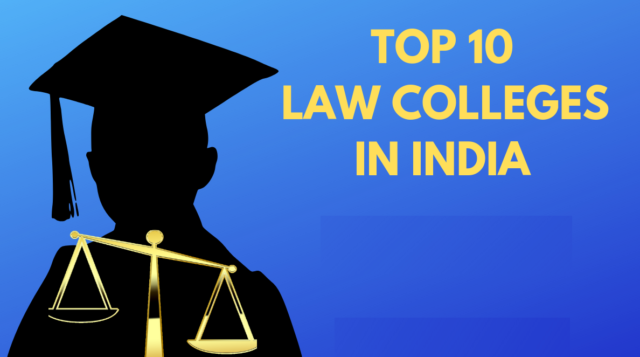Top 10 Law Courses in India 2023
Law courses are programs of study that focus on teaching students about the legal system and the various aspects of law. These courses cover a wide range of topics, including constitutional law, contract law, criminal law, property law, tort law, and international law. Law courses prepare students for a career as a lawyer, judge, or legal analyst. The curriculum of a law course includes lectures, case studies, simulations, and mock trials. Additionally, many law schools also provide students with opportunities for practical training through internships, externships, and clinical programs.
Law courses in India are offered by several law schools and universities. Some popular law courses are:
- LL.B (Bachelor of Laws)
- LL.M (Master of Laws)
- B.A LL.B
- B.B.A LL.B
- Diploma in Law
Admission to these courses is usually based on entrance exams such as CLAT, LSAT India, AILET, etc. Graduates from any discipline are eligible to pursue a law degree.
Contents
- 1 Top 10 Law Courses in India 2023
- 1.1 LL.B (Bachelor of Laws)
- 1.2 B.A LL.B (Bachelor of Arts + Bachelor of Laws)
- 1.3 LL.M (Master of Laws)
- 1.4 B.B.A LL.B (Bachelor of Business Administration + Bachelor of Laws)
- 1.5 Diploma in Law
- 1.6 B.Com LL.B (Bachelor of Commerce + Bachelor of Laws)
- 1.7 BALLB (Bachelor of Arts + Bachelor of Legislative Law)
- 2 SJD (Doctor of Juridical Science)
- 3 Conclusion
Top 10 Law Courses in India 2023
Here are the top 10 law courses in India with brief detail:
LL.B (Bachelor of Laws)
LL.B (Bachelor of Laws) is a 3-year undergraduate program that focuses on the study of law and the legal system. It is the most popular law course in India and is considered the first step towards becoming a lawyer. The curriculum of the LL.B program covers a wide range of legal topics, including constitutional law, contract law, criminal law, property law, and tort law.
LL.B graduates are equipped with a comprehensive understanding of the legal system, as well as the analytical, research, and writing skills necessary for a successful legal career. Upon completion of the LL.B program, students can choose to work as lawyers, legal advisors, or take up further studies such as LL.M (Master of Laws). Admissions to LL.B courses are usually based on entrance exams such as CLAT, LSAT India, AILET, etc.
B.A LL.B (Bachelor of Arts + Bachelor of Laws)
B.A LL.B (Bachelor of Arts + Bachelor of Laws) is a 5-year integrated program that combines the study of arts and law. It is a dual degree program where students earn a Bachelor of Arts degree as well as a Bachelor of Laws degree. The curriculum of the B.A LL.B program includes both arts and law subjects, providing students with a well-rounded education.
The program covers a wide range of legal topics, including constitutional law, contract law, criminal law, property law, and tort law. Students also study subjects from the arts stream, such as history, economics, political science, and other humanities subjects. B.A LL.B graduates are equipped with a comprehensive understanding of the legal system, as well as strong communication, analytical, and research skills.
Upon completion of the B.A LL.B program, students can choose to work as lawyers, legal advisors, or take up further studies such as LL.M (Master of Laws). Admissions to B.A LL.B courses are usually based on entrance exams such as CLAT, LSAT India, AILET, etc.
LL.M (Master of Laws)
LL.M (Master of Laws) is a 2-year postgraduate program that focuses on advanced legal studies. It is designed for students who have completed their Bachelor of Laws (LL.B) and want to specialize in a particular area of law. LL.M programs offer a range of specializations, including Corporate Law, Intellectual Property Law, Human Rights Law, Taxation Law, etc.
The curriculum of the LL.M program is designed to provide students with a comprehensive understanding of their chosen area of specialization. Students attend lectures, participate in seminars, and engage in independent research. LL.M graduates are equipped with a deep understanding of the legal system, as well as advanced analytical, research, and writing skills.
Upon completion of the LL.M program, students can choose to work as lawyers, legal advisors, or take up further studies such as Ph.D in Law. Admissions to LL.M programs are usually based on entrance exams, such as CLAT, LSAT India, AILET, etc. and a bachelor’s degree in law is a pre-requisite for enrolling in LL.M program.
B.B.A LL.B (Bachelor of Business Administration + Bachelor of Laws)
B.B.A LL.B (Bachelor of Business Administration + Bachelor of Laws) is a 5-year integrated program that combines the study of business administration and law. It is a dual degree program where students earn a Bachelor of Business Administration degree as well as a Bachelor of Laws degree. The curriculum of the B.B.A LL.B program includes both business administration and law subjects, providing students with a well-rounded education.
The program covers a wide range of legal topics, including corporate law, intellectual property law, tax law, and other areas of law relevant to business. Students also study subjects from the business administration stream, such as finance, marketing, economics, and management. B.B.A LL.B graduates are equipped with a comprehensive understanding of the legal system, as well as strong business acumen and communication skills.
Upon completion of the B.B.A LL.B program, students can choose to work as corporate lawyers, legal advisors, or take up further studies such as LL.M (Master of Laws). Admissions to B.B.A LL.B courses are usually based on entrance exams such as CLAT, LSAT India, AILET, etc.
Diploma in Law
Diploma in Law is a 1-2 year program that provides students with a basic understanding of the legal system and legal processes. It is designed for students who want to gain knowledge in the field of law, but do not wish to pursue a full-fledged law degree. The curriculum of the Diploma in Law program covers a wide range of legal topics, including constitutional law, contract law, criminal law, property law, and tort law.
Diploma in Law graduates are equipped with a basic understanding of the legal system, as well as some practical legal skills, such as legal drafting, legal writing, and legal research. Upon completion of the Diploma in Law program, students can choose to work in the legal industry as legal executives, legal assistants, or paralegals. Admissions to Diploma in Law programs are usually based on a minimum eligibility criteria of 10+2 or equivalent.
B.Com LL.B (Bachelor of Commerce + Bachelor of Laws)
B.Com LL.B (Bachelor of Commerce + Bachelor of Laws) is a 5-year integrated program that combines the study of commerce and law. It is a dual degree program where students earn a Bachelor of Commerce degree as well as a Bachelor of Laws degree. The curriculum of the B.Com LL.B program includes both commerce and law subjects, providing students with a well-rounded education.
The program covers a wide range of legal topics, including corporate law, tax law, intellectual property law, and other areas of law relevant to commerce. Students also study subjects from the commerce stream, such as accounting, finance, economics, and management. B.Com LL.B graduates are equipped with a comprehensive understanding of the legal system, as well as strong business acumen and communication skills.
Upon completion of the B.Com LL.B program, students can choose to work as corporate lawyers, legal advisors, or take up further studies such as LL.M (Master of Laws). Admissions to B.Com LL.B courses are usually based on entrance exams such as CLAT, LSAT India, AILET, etc.
BALLB (Bachelor of Arts + Bachelor of Legislative Law)
BALLB (Bachelor of Arts + Bachelor of Legislative Law) is a 5-year integrated program that combines the study of Arts and Legislative Law. It is a dual degree program where students earn a Bachelor of Arts degree as well as a Bachelor of Legislative Law degree. The curriculum of the BALLB program includes subjects from both arts and law, providing students with a well-rounded education.
The program covers a wide range of legal topics, including constitutional law, criminal law, contract law, property law, and other areas of law relevant to the legislative system. Students also study subjects from the arts stream, such as history, economics, political science, and sociology. BALLB graduates are equipped with a comprehensive understanding of the legal system, as well as a strong foundation in the social sciences.
Upon completion of the BALLB program, students can choose to work as lawyers, legal advisors, or take up further studies such as LL.M (Master of Laws). Admissions to BALLB courses are usually based on entrance exams such as CLAT, LSAT India, AILET, etc. and a minimum eligibility criteria of 10+2 or equivalent.
SJD (Doctor of Juridical Science)
SJD (Doctor of Juridical Science) is a research-based doctoral degree program in law. It is a higher degree program that is designed for students who wish to specialize in a particular area of law and make a contribution to legal scholarship. The SJD program is typically a full-time, 2-3 year course of study, although some universities may offer part-time or online options.
The SJD curriculum requires students to complete advanced coursework in their area of specialization, as well as conduct original legal research and write a dissertation. The dissertation is an in-depth research project that makes a significant contribution to the field of law. SJD graduates are equipped with a high level of expertise in their area of specialization, as well as strong research and writing skills.
Upon completion of the SJD program, graduates can choose to work as legal academics, policy experts, or legal consultants in the private or public sector. Admissions to SJD programs are highly competitive and typically require a LL.M (Master of Laws) degree, strong academic record, and letters of recommendation.
Ph.D in Law
Ph.D in Law is a research-based doctoral degree program in law. It is designed for students who wish to specialize in a particular area of law and make a contribution to legal scholarship. The Ph.D program is typically a full-time, 3-5 year course of study, although some universities may offer part-time or online options.
The Ph.D curriculum requires students to complete advanced coursework in their area of specialization, as well as conduct original legal research and write a dissertation. The dissertation is an in-depth research project that makes a significant contribution to the field of law. Ph.D in Law graduates are equipped with a high level of expertise in their area of specialization, as well as strong research and writing skills.
Upon completion of the Ph.D in Law program, graduates can choose to work as legal academics, policy experts, or legal consultants in the private or public sector. Admissions to Ph.D in Law programs are highly competitive and typically require a LL.M (Master of Laws) degree, strong academic record, and letters of recommendation.
PG Diploma in Intellectual Property Rights Law
PG Diploma in Intellectual Property Rights Law (PGDIPR) is a postgraduate program that focuses on the study of intellectual property laws and regulations. It is a 1-2 year program that provides students with a comprehensive understanding of the laws related to copyrights, trademarks, patents, and other forms of intellectual property.
The curriculum of the PGDIPR program covers subjects such as trademark law, patent law, copyright law, trade secret law, and international intellectual property law. Students learn about the protection of intellectual property rights, the legal procedures for filing and protecting patents and trademarks, and the enforcement of intellectual property rights.
Upon completion of the PGDIPR program, students can choose to work in a variety of roles, including as IP lawyers, IP consultants, in-house counsel in IP-rich industries, and IP enforcement agencies. Admissions to PGDIPR programs are usually based on entrance exams and a minimum eligibility criteria of a bachelor’s degree in any stream.
Conclusion
In conclusion, pursuing a law degree in India can lead to a rewarding career in the legal field. There are several options available for students who want to study law, including undergraduate, postgraduate and doctoral programs. To become a successful lawyer, students must have good communication and analytical skills, as well as an understanding of the legal system and regulations. With the increasing demand for legal professionals in India, pursuing a law course can be a promising career choice.











Leave a Reply